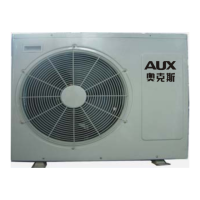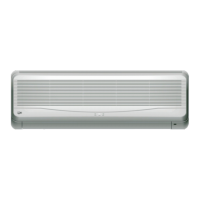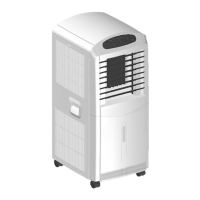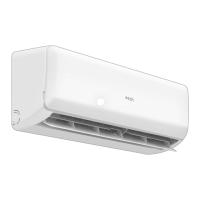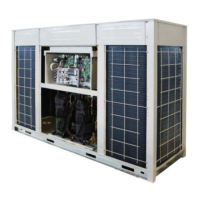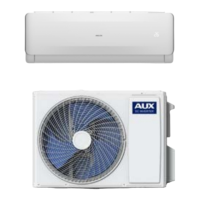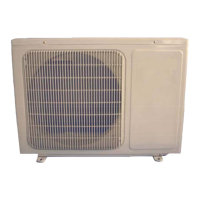AUX air conditioner service manual
194
Chapter 8 Troubleshooting guide for Refrigerating System
Refrigerating system faults are very common to air conditioners; faults are various but they still have
some rules and also many maintenance experiences for reference. Troubleshooting steps here for
refrigerating system are not a must, but can be followed to eliminate faults.
1. Main steps for refrigerating system troubleshooting
⑴Check work condition of indoor and outdoor units including display condition of indicator panel,
check whether indoor unit works and air velocity is normal, whether outdoor fan and compressor runs;
Based on foregoing steps, we can judge what is the cause of refrigerating fault, electrical system or the
refrigerating system.
⑵Check all data of air conditioner
①Water drainage condition: Normally drainage water from indoor unit shall be continuous, but
impacted by environment humidity and temperature, this condition only can be taken for reference.
②Indoor unit air inlet and outlet temperature difference: Normal temperature difference shall be
within 12-14 Celsius degree, but they will also be impacted by temperature and wind velocity.
③Measure pressure of system: Generally speaking, in cooling operation, low pressure shall be within
0.45Mpa-0.50Mpa, and in heating operation, high pressure shall be within 1.8Mpa-2.2Mp; but
pressure may be impacted by ambient temperature. If outdoor air inlet temperature rise, gas discharge
pressure will be higher and condense temperature will be higher; on the contrary the result would be
lower. When load on air conditioner increases, return gas pressure will be higher and evaporate
temperature will be higher (normal evaporate temperature shall fall within 5 to 7 Celsius Degree).
2. Refrigerating system faults type
⑴Refrigerating system is blocked, often in capillary and dry filter which are narrowest in the whole
system. Normally, there’re 3 causes for block: dirt, ice and weld blocks.
①Dirt block generally occurs on the inlet of capillary because dirt in copper tube (such as slug, rust
scrap and scale) blocks refrigerating system. Knock the capillary slightly and air conditioner may
restore normal condition temporarily; In addition, we can judge block position and features from
condensate and frost on the surface of components as well as time for velocity restoration when air
condition is turned off.
②Ice block normally occurs on the outlet of capillary, because there’s some water in the system,
which suddenly vaporizes, cools down, condenses and becomes little ice particle and block the outlet
of capillary. We can heat the capillary outlet with welding machine, if air conditioner works again or
functions better, or switch off the air conditioner and then turn on again, it can refrigerate again for a
while, we can conclude that the refrigerating system is blocked by ice. In general, ice block occurs on
the newly installed or newly repaired air conditioner.
③Weld block occurs on the welds of capillary with similar phenomena as dirt block, and also often
happen in newly installed air conditioners.
⑵Leakage of refrigerating system: media of heating and cooling in air conditioner is refrigerant, if

